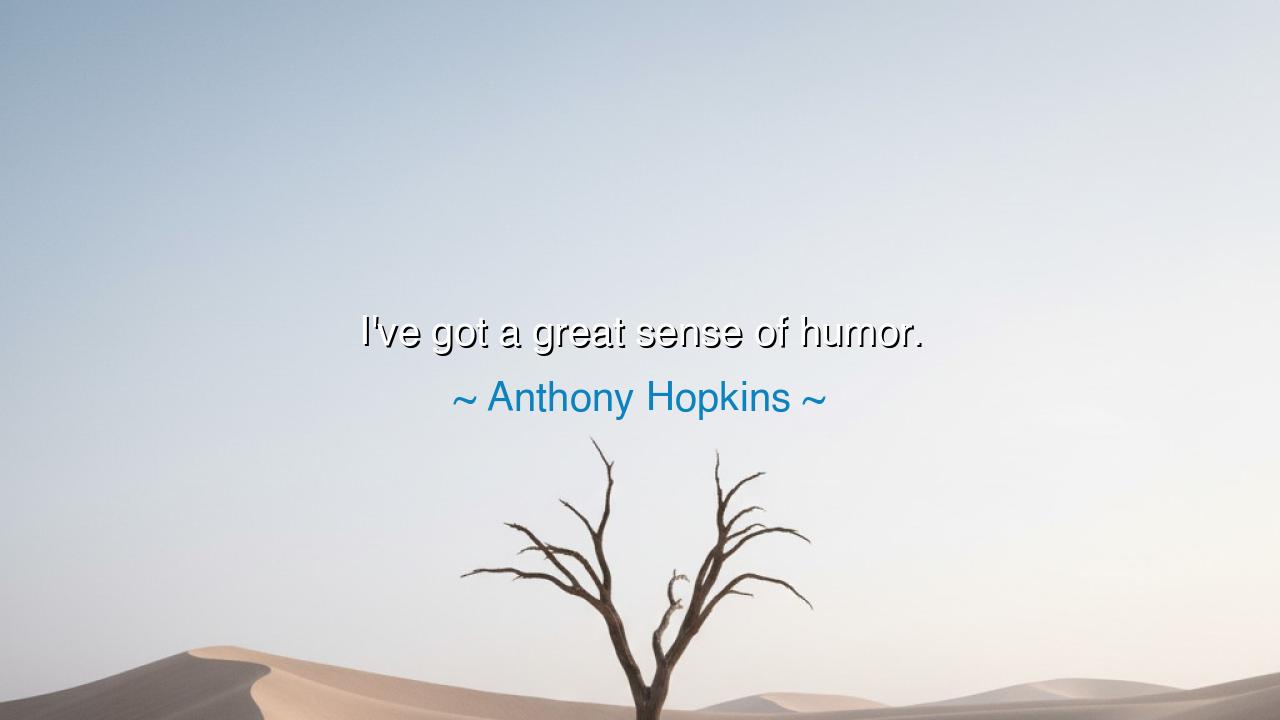
I've got a great sense of humor.






“I’ve got a great sense of humor.”
Thus spoke Anthony Hopkins, the master of his craft, the man whose face has held both the gentleness of wisdom and the darkness of madness. In these few words lies not arrogance, but understanding — the recognition that humor is not a luxury, but a survival tool; not mere laughter, but a philosophy of endurance. Hopkins’ declaration carries the weight of a man who has walked through both triumph and torment and learned that the soul, if it is to remain whole, must learn to laugh — not at others, but at itself and the absurdity of existence.
To say “I’ve got a great sense of humor” is not to boast of wit, but to reveal a secret strength. For those who possess true humor are not shallow jesters, but deep thinkers who have seen the shadow and still found light. Hopkins, who has spent his life portraying the full spectrum of human nature — from kings to killers, saints to sinners — knows that laughter is the counterbalance to despair. Humor, rightly understood, is not the absence of pain, but the transformation of it. It is the alchemy of the spirit, turning fear into freedom and sorrow into wisdom.
From the ancient philosophers to the modern sages, this truth has been whispered across time: the ability to laugh is the mark of a soul at peace with its own contradictions. The Stoic emperor Marcus Aurelius, though burdened by the weight of empire, reminded himself to smile at the folly of life, for to take existence too seriously is to be crushed by it. Likewise, Hopkins, who has spoken of his battles with doubt, discipline, and inner darkness, carries the same lesson — that a “great sense of humor” is not frivolity, but the very essence of sanity.
In this sense, humor is not the mask of the lighthearted, but the armor of the wise. It is said that when Leonardo da Vinci was painting The Last Supper, he often joked with his apprentices, even while working on Christ’s face. They asked him how he could jest while creating something sacred, and he replied, “Because laughter keeps the hand steady.” So too does Hopkins remind us that the artist — and indeed, every human soul — must temper intensity with levity. Without humor, the mind burns itself out; with humor, it is refreshed, renewed, and ready to create again.
There is a kind of divine humor that runs through the fabric of life. It is the laughter that echoes after tragedy, the smile that rises unbidden after tears. Hopkins, with his unmistakable voice and presence, embodies that paradox. In his most fearsome roles — the chilling Hannibal Lecter or the broken patriarch in The Father — there is always a flicker of irony, a glimmer of self-awareness. It is as though he is telling us, “Do not fear the dark — for even in the darkest chamber, the spirit may find a joke, a light, a release.” His humor is not mockery; it is acceptance, the laughter of one who knows the universe is vast, unpredictable, and sometimes absurdly beautiful.
The origin of this quote is not found in boastful pride, but in a life lived with contrast. Hopkins, born in Wales to humble beginnings, rose through struggle and solitude. He faced rejection, doubt, and the gnawing loneliness that shadows many great artists. Yet through it all, he found refuge in humor — a reminder that life is not meant to be conquered, but danced with. To have “a great sense of humor” is to have the strength to endure the chaos of being human without losing joy. It is to say, “I have made peace with imperfection, with folly, with the cosmic joke that is existence.”
So let this be the teaching drawn from Anthony Hopkins’ simple yet profound statement:
-
Embrace humor as a sacred strength, not a trivial distraction.
-
Laugh at yourself, for self-ridicule is the first step toward wisdom.
-
Balance gravity with levity, for the soul needs both depth and air to breathe.
-
See life as theater, and remember that you are both actor and audience in its divine comedy.
Thus spoke Anthony Hopkins, and through him the timeless truth resounds: that laughter is not the denial of suffering, but its transcendence. To laugh well is to live wisely. And so, O listener, when the world grows heavy and the heart grows tired, remember this — that the universe itself has a sense of humor, and that to share in it is to share in its immortality. For the one who laughs with understanding, even in sorrow, is the one who truly lives with grace.






AAdministratorAdministrator
Welcome, honored guests. Please leave a comment, we will respond soon